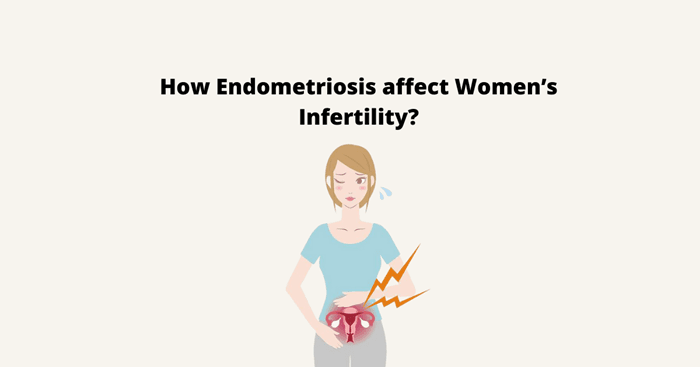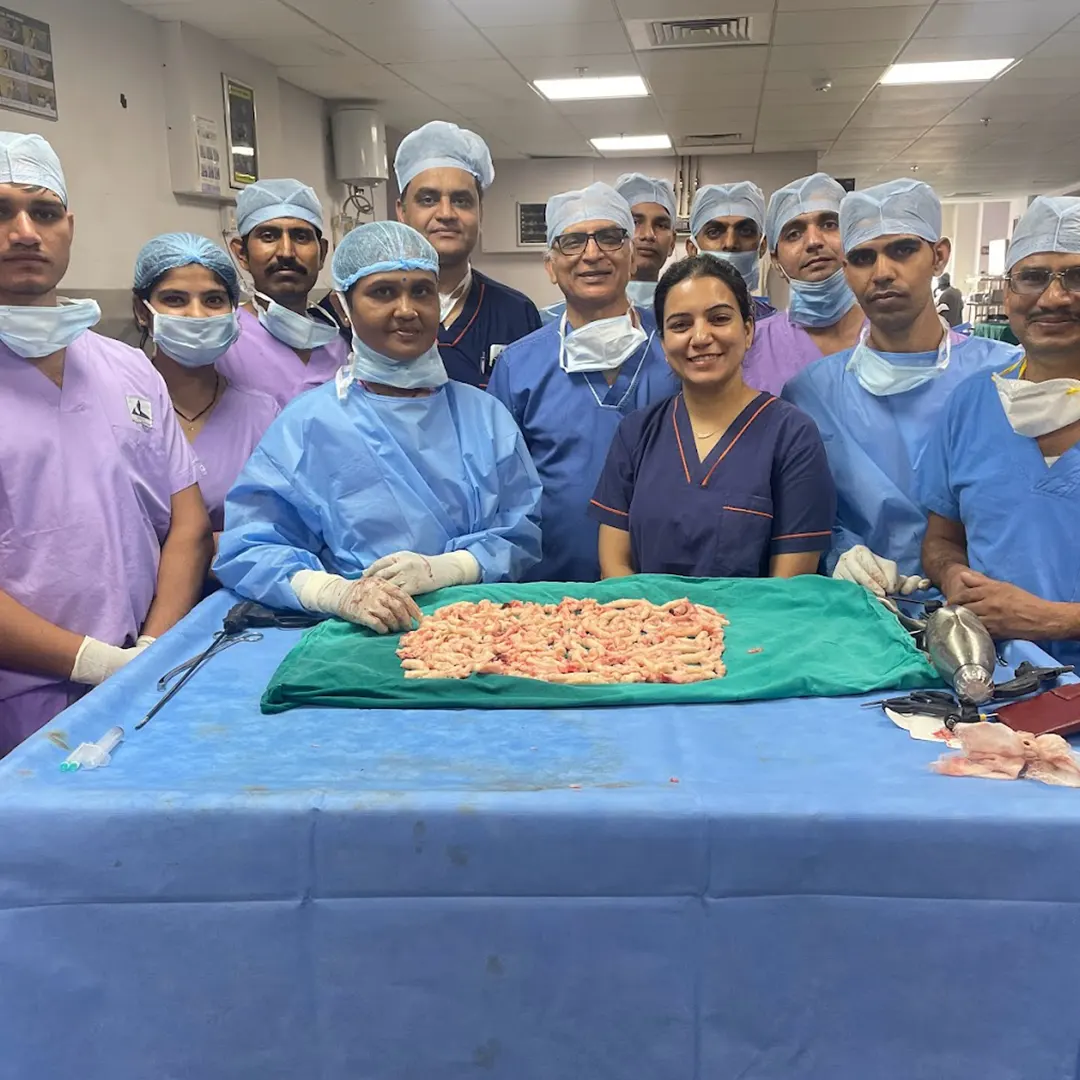Endometriosis is a condition when a tissue very much like your uterine lining starts growing outside the uterus. As this tissue grows, it will start affecting the nearby organs and may affect fertility.
The abnormal tissue growth may also lead to bleeding under certain circumstances. This abnormal growth can also lead to blockage of ovaries and fallopian tubes, leading to infertility.
Infertility is a condition when the woman fails to conceive due to any underlying medical condition. Endometriosis is one of those underlying medical conditions which can make it hard for a person to conceive.
Thus, there is a direct relation between endometriosis and infertility. But what is it? Let’s find out with Renowned Gynecologist in Jaipur Dr. Pankhuri Gautam.
Does Endometriosis Cause Infertility?
Some women who have endometriosis can get pregnant naturally. However, around one-third of women who have endometriosis have faced difficulty in getting pregnant. Therefore, it cannot be completely ruled out that endometriosis does affect fertility, although in different ways.
The egg is released from the ovaries and travels through the fallopian tube, where the sperm fertilizes it. After the egg is fertilised in the fallopian tube by the sperm, the woman will get pregnant. The pregnancy period is complete only when the fertilised egg attaches to the uterine lining.
However, if you have endometriosis, there are chances that you may have trouble getting pregnant due to the abnormal tissue. Endometriosis will lead to a blockage in the fallopian tube or even prevent the eggs from the ovaries from being released. The abnormal tissue growth will also prevent the fallopian tubes from working properly. Under some circumstances, endometriosis can also prevent the fertilised egg from attaching to the uterus.
When endometriosis doesn’t affect your fertility directly, it will have an impact indirectly by damaging the egg or sperm. Endometriosis can also lead to inflammation, which will disturb the hormonal balance in the woman’s body, thereby preventing her from getting pregnant. However, with proper treatment, women who have endometriosis can still get pregnant.
Endometriosis Types and Fertility
Endometriosis is usually categorised depending on which parts of the body the patches have grown. According to the classifications, a person can have one or multiple endometriosis types.
- Superficial Peritoneal
The peritoneum is the thin film lining above the abdomen. Women who have peritoneal lesions have a cyst around the peritoneum. The superficial peritoneal lesion is stage I or II of endometriosis. It isn’t that serious, but some women may have issues in conceiving.
- Endometriomas
Women suffering from this condition have cysts growing on the surface of their ovaries or inside them. Since the cysts appear as if they are dark and filled sacs, they are also known as chocolate cysts. Endometriomas are classified as Stage III or IV endometriosis. This often leads to the formation of scar tissue on ovaries and fallopian tubes, which further causes women to have ovulation issues.
- Deeply infiltrating
In this condition, the cyst starts growing around the uterus, vagina or bladder and is an extremely serious condition. It is considered final stage IV endometriosis. Women suffering from this condition may also experience scarring across their ovaries, uterus or rectum. It will be impossible for a woman to conceive who is in this stage of endometriosis. Thus, they will have to resort to IVF treatment.
Fertility Index for Endometriosis
Various factors are responsible for causing endometriosis in a person. Usually, doctors consider multiple factors upon treatment, such as age, length of infertility, medical history, and the current stage of endometriosis.
Usually, doctors will look into these factors and estimate which individual can get pregnant. When the likelihood of getting pregnant is predicted, doctors and individuals can act accordingly.
However, it is essential to note that the likelihood of getting pregnant can vary from person to person. While some people may get pregnant within a year without any medical assistance, others may need time. Our doctors will, therefore, look into your least function score (calculated using fallopian tube and ovarian function measure) and determine the best treatment for you.
Fertility Treatment Options for Endometriosis
Women who have failed to conceive, even after six to twelve months of trying, should consider medical attention immediately. Our doctors can prescribe you the best medicine and solution depending on your condition.
- Stages I-II
Usually, people in the early stages of endometriosis can get pregnant quickly without any medical help. However, if they are still suffering, a laparoscopy is usually performed on them to check the number of lesions the individual has.
Laparoscopy is a simple surgery but may have risks related to it. If the lesion is removed from the ovary, the number of eggs will also potentially decrease. Women over the age of 35 years are advised to undergo intrauterine insemination rather than surgery.
They may also be prescribed clomiphene citrate during the treatment to trigger ovulation. Once ovulation begins, the process of intrauterine insemination will also begin. In case of failure of this treatment, the doctor may recommend IVF.
- Stages III-IV
The later stages of endometriosis are slightly risky, and getting pregnant naturally will be impossible. Thus, the doctor will recommend IVF during this stage. Fertility medications are injected during this stage to promote egg growth.
When the person has enough eggs, they will be harvested. After the eggs are harvested, only the best quality ones will be fertilised by the sperm for egg formation. After the embryo is formed, it will be transferred into the uterus for healthy growth.
Endometriosis and Infertility: Support
Endometriosis is a painful condition that only progresses with time and can get worse if not treated in time. Many women who struggle to get pregnant not only have to suffer physically, but also a lot of them slip into depression. Thus, these women start to feel agitated, isolated, and discouraged.
A proper support group or doctor encouragement can offer them comfort and support. Thus, it is extremely important to reach out to professionals and get sufficient medical or mental support. Our expert, Dr Pankhuri Gautam, can offer sufficient support to women and help them cope. If not naturally, other IVF treatments are available, too, and our experts can help you with those.
Final Thoughts
Endometriosis is scary, but it is not fatal. It can have an impact on your fertility, but if you’re prepared and have the right medical attention, things can be easier for you. Undoubtedly, you may experience some delay in getting pregnant, but our doctors can help you.
We understand that living with endometriosis is deadly and can be painful, but there are support groups, toxo. You’re not the only one who is struggling; there are many others, too. If you need any medical attention, schedule your consultation with Dr Pankhuri Gautam today!



